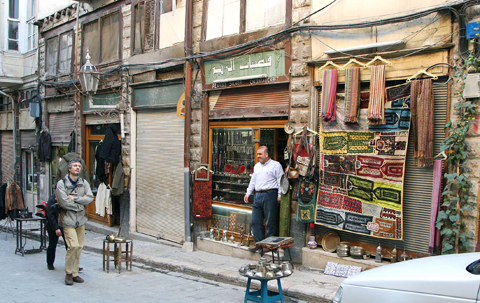Iranian pilgrims pray beside Arabs at the 8th-century Umayyad Mosque, one of Islam’s grandest sites. Down a nearby alley, European tourists watch restoration work at an Ottoman-era palace being converted into a hotel.
“I’ve not seen such contrast between image and the reality,” German tourist Anna Kopola said, looking at Syrian art on display in a gallery in the capital, Damascus. “Syria is portrayed as a center of terrorism in the West, but it’s peaceful and modern.”
While tourists have long traveled to see Egypt’s pyramids, tense ties with the West made Syria a no-go zone for decades.

PHOTO: AP
Few have heard of the magnificent ruins at Dura Europos, a Graeco-Roman city dubbed the Pompeii of the desert, or Krak des Chevaliers, among the world’s greatest Crusader castles.
But a rapprochement with the West — Syria this month invited US President Barack Obama to Damascus for talks — and the gradual liberalization of an economy that long shunned foreign input are helping Syria shed its pariah state image.
“Nicolas Sarkozy’s visit last year was a boost,” Antoine Mamarbachi, a tour operator said of the French president.

PHOTO: REUTERS
“Syria is no longer a persona non grata,” he said.
Tourist numbers rose 15 percent last year and Syrian Tourism Minister Saadallah Agha al-Qalaa expects 40,000 new hotel beds to become available in the next three years, up from 48,000 now.
Demand has grown so fast, he said, that Syrian tourism may escape the impact of the global downturn that has hit the sector worldwide. Tourism already accounts for 13 percent of Syria’s gross domestic product and will only become more important as the Arab country’s dwindling oil production falls further.
Syria has so far tended to attract visitors from other parts of the Middle East, who are less perturbed by its image and more interested in its beach resorts. Two-thirds of visitors last year were Arab, but promotional campaigns by the state and tour operators over the last year have targeted high-end Europeans.
As the East-West crossroads of the ancient world, Syria has been a trade hub for centuries, attracting European adventurers from Lawrence of Arabia to Freya Stark.
Dura Europos, the ruined walled city above the banks of the Euphrates, produced early examples of Judaic and Christian art. The Umayyad Dynasty made Damascus the capital of a Muslim empire that stretched to Spain.
Legend has it that two heads are buried beneath the Ummayad Mosque — those of John the Baptist and Imam Hussein, an early Islamic figure whose killing in 680 cemented Shiite-Sunni splits.
But Syria’s modern history has been dominated by its struggle with Israel and Soviet-style policies since the Baath Party’s 1963 coup that reduced it to an economic backwater.
The US imposed sanctions on Syria in 2004 and the government faces two UN investigations, although tensions have eased in recent months and Washington said last month it would appoint an ambassador to Damascus after a four-year hiatus.
“The business environment in Syria is still poorer than its neighbors, but this is a virgin market and the fact that so many investors are coming shows that the risk is worth taking,” said Jihad Yazigi, editor of the Syria Report online newsletter.
Only in the past decade has Syria eased restrictions on foreign exchange and banking and allowed companies to transfer profits abroad. But it remains among the world’s hardest places to do business, a World Economic Forum study said.
Courts lack safeguards against political interference and the workforce lacks language skills and training. Yet the risks have not put off investors from the oil-exporting Gulf.
Qatari Diyar, a real estate company owned by the Qatar Investment Authority, is building a US$350 million resort on the Mediterranean coast. Kuwait’s Kharafi group is building a 361-room hotel in Damascus. Global hotel brands — including Movenpick, Kempinski and Holiday Inn — also plan developments.
“Syria is a bargain, although it needs to develop its infrastructure,” Kuwaiti businessman Abdul Hameed Dashti said.
In the covered souqs of Old Damascus, Western tourists now shop for Syrian kilims and amble from the tomb of the Mamluk ruler Baibars to courtyard houses-turned-boutique hotels.
Gone are the days when a visitor could wander through the ruins of Palmyra, a classical city that rises like a mirage from the eastern desert, without encountering another soul.
“Syria needs to do more preservation. I was in Lebanon and the level of indiscriminate construction made me never want to go back,” Swiss tourist Roland Diethelm said.
Repeated wars have left scars on Syria’s neighbor Lebanon, but those tourists who do make the journey often combine it with a short drive to Damascus.
Construction across Syria has been chaotic but investors are taking increasing care to preserve the character of Old Damascus and Aleppo, realizing that this is what many Europeans crave.
Opened a year ago, Beit Zaman hotel is a painstakingly restored 300-year-old courtyard house located on Damascus’ Roman-era Straight Street, which is mentioned in the Bible.
“Our customers appreciate the restoration work we have done and the feel of Old Damascus,” Beit Zaman spokeswoman Solar Arissian said.

CRITICAL MOVE: TSMC’s plan to invest another US$100 billion in US chipmaking would boost Taiwan’s competitive edge in the global market, the premier said The government would ensure that the most advanced chipmaking technology stays in Taiwan while assisting Taiwan Semiconductor Manufacturing Co (TSMC, 台積電) in investing overseas, the Presidential Office said yesterday. The statement follows a joint announcement by the world’s largest contract chipmaker and US President Donald Trump on Monday that TSMC would invest an additional US$100 billion over the next four years to expand its semiconductor manufacturing operations in the US, which would include construction of three new chip fabrication plants, two advanced packaging facilities, and a research and development center. The government knew about the deal in advance and would assist, Presidential

‘DANGEROUS GAME’: Legislative Yuan budget cuts have already become a point of discussion for Democrats and Republicans in Washington, Elbridge Colby said Taiwan’s fall to China “would be a disaster for American interests” and Taipei must raise defense spending to deter Beijing, US President Donald Trump’s pick to lead Pentagon policy, Elbridge Colby, said on Tuesday during his US Senate confirmation hearing. The nominee for US undersecretary of defense for policy told the Armed Services Committee that Washington needs to motivate Taiwan to avoid a conflict with China and that he is “profoundly disturbed” about its perceived reluctance to raise defense spending closer to 10 percent of GDP. Colby, a China hawk who also served in the Pentagon in Trump’s first team,

SEPARATE: The MAC rebutted Beijing’s claim that Taiwan is China’s province, asserting that UN Resolution 2758 neither mentions Taiwan nor grants the PRC authority over it The “status quo” of democratic Taiwan and autocratic China not belonging to each other has long been recognized by the international community, the Mainland Affairs Council (MAC) said yesterday in its rebuttal of Beijing’s claim that Taiwan can only be represented in the UN as “Taiwan, Province of China.” Chinese Minister of Foreign Affairs Wang Yi (王毅) yesterday at a news conference of the third session at the 14th National People’s Congress said that Taiwan can only be referred to as “Taiwan, Province of China” at the UN. Taiwan is an inseparable part of Chinese territory, which is not only history but

INVESTMENT WATCH: The US activity would not affect the firm’s investment in Taiwan, where 11 production lines would likely be completed this year, C.C. Wei said Investments by Taiwan Semiconductor Manufacturing Co (TSMC, 台積電) in the US should not be a cause for concern, but rather seen as the moment that the company and Taiwan stepped into the global spotlight, President William Lai (賴清德) told a news conference at the Presidential Office in Taipei yesterday alongside TSMC chairman and chief executive officer C.C. Wei (魏哲家). Wei and US President Donald Trump in Washington on Monday announced plans to invest US$100 billion in the US to build three advanced foundries, two packaging plants, and a research and development center, after Trump threatened to slap tariffs on chips made